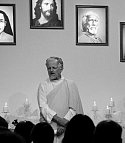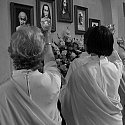In late 1986 Swamiji wrote the Festival of Light in Assisi. In early 1987 it was introduced to the Village, along with other changes in Sunday service. Soon all the centers had incorporated the Festival into their Sunday services. The ministers were

Nitai Deranja
now called Light Bearers, and were empowered to read the Festival, lead purification ceremonies, and perform other ceremonies such as discipleship, weddings, funerals and baptisms. Swamiji also asked us to begin wearing white robes for these functions. His intent was to give dignity to the ministers, and through the Festival, to describe our path each Sunday.
Ceremonies are a means of getting groups of people to unite their thoughts and energies. When we hadn’t the Festival of Light, newcomers to Sunday service may have gone away with the impression that our teachings focused on relationships, or on raising children, or on how to succeed in life.
A statement read aloud, on the other hand, summarizing our teachings, would probably pass right over people’s heads. It doesn’t involve them.
The Festival of Light expresses the core of what we stand for in a moving way. It involves people in a way they’ll remember. When you haveFestival of Light
Jamuna and prem-shantisomething that’s rhythmic, with images that are alive, people absorb the words. Weeks later, they will remember a particular phrase. There is a sentence in the Festival, for example, that goes, ‘O Children of light, forsake the darkness!’ Many people afterwards have exclaimed to friends, ‘You know, that’s right! I am a child of the light. I’m not a child of darkness.’
These things, especially when heard repeatedly, enter the subconscious mind and affect the way people look at the whole world. To read the same thoughts in prose form, rather than poetically, and as dry announcements rather than in ceremonial form, would in time become boring. Thus, ceremony can have a real power. It helps people to feel that what they are receiving is not a philosophical statement, but a ray of light and power from the Divine. Again, people participate in a ceremony. They go to the altar to receive the light. And so they leave remembering that it is the grace of the Masters that will change their lives.
The Festival of Light, again, helps to deepen people’s awareness of the importance of channels for the divine light, not only the Masters as channels for it, but also their disciples. It is good for people not only to feel respect for those from who they can draw as channels, but also to think, ‘I too, should offer myself up more as a channel.’ Thus, they develop a greater sense of responsibility on the path. Indeed, we grow as we, too, serve as instruments for the light, instead of just taking for ourselves what blessings we can. It’s when people take an active part in this movement that they find themselves being drawn into its heart.
—Swami Kriyananda, in an interview in Clarity Magazine, July 1988From the depths of unknowing, Lord, we cry out to Thee:
Is there no lasting purpose to our lives?
Behold, all that we thought was light
Was but darkness!
Who are we, in reality?
For what end were we made?
Ever and again through Your awakened sons
the answer comes:
The forming of stars and moons and planets,
of galaxies revolving on the tides of space,
of drifting continents, upheaving mountains,
snowy wastes and dark, silent ocean deeps
had but this for its design: The birth of life,
and with life’s birth, the dawn of self-awareness:
Passage through dim corridors of waking consciousness
to emerge at last into infinite light –
into perfect joy!
O Children of Light, forsake the darkness!
Know that, forever, you and He are one.
“Sing out, sing out with joy!
God’s light has descended.
Sing out, sing out with joy!
All our nights have ended!
Light on every mountain,
Oh, light in every valley!
Light from all the masters;
We live in the Lord!”
—from The Festival of LightNext

